Why We Do Aromatherapy
Are you curious about the soothing scents that can help reduce stress and anxiety, improve sleep quality, and alleviate pain?
Aromatherapy might be just the solution you’re looking for.
In this article, we will explore the origins and evolution of aromatherapy, how essential oils work to benefit the body, different methods of using aromatherapy purposes, and important safety precautions to keep in mind.
Discover the power of aromatherapy and how it can enhance your overall well-being.
Key Takeaways:
What is Aromatherapy?
Aromatherapy is a holistic healing treatment that uses natural plant extracts, such as essential oils, to promote overall health and well-being. These essential oils are derived from various parts of plants and have been used for centuries to enhance physical and emotional health.
Originating from ancient civilizations like Egypt, China, and India, the practice of aromatherapy involves harnessing the therapeutic properties of these concentrated oils extracted through methods like distillation or cold pressing. The essence of plants, carefully preserved in these oils, provides a range of benefits that aid in relaxation, stress relief, and even boosting immunity.
History of Aromatherapy
The history of aromatherapy dates back thousands of years when ancient civilizations recognized the healing properties of plants and their extracts. Medical practitioners in various cultures have utilized aromatic plants for their therapeutic benefits long before the modern research validated their efficacy.
For instance, the Egyptians are known to have extensively used aromatic oils in religious ceremonies, embalming processes, and for medicinal purposes. In ancient China, the use of plant extracts like camphor and cinnamon was prevalent in treating various ailments. Similarly, the Greeks and Romans incorporated fragrant herbs in their baths and massages to promote healing and relaxation.
Over time, the understanding of how plant compounds interact with the human body has deepened, leading to the integration of aromatherapy into modern medical practices. Researchers continue to explore the therapeutic potential of essential oils for conditions ranging from stress and anxiety to pain management and skincare.
Where Did Aromatherapy Originate?
The practice of aromatherapy originated in ancient civilizations such as Egypt, China, and India, where natural plant extracts were used for their healing properties. In modern times, institutions like the Cleveland Clinic have incorporated aromatherapy into Complementary and Alternative Medicine (CAM) practices.
Aromatherapy traces its roots back to ancient cultures that valued the therapeutic effects of essential oils and plant essences. The Egyptians, known for their advancements in herbal medicine, utilized oils for physical and spiritual well-being.
In China, the use of aromatic substances was deeply interconnected with traditional medicine, focusing on balancing the body’s energy channels.
Similarly, in India, the ancient practice of Ayurveda incorporated aromatic oils in massages and treatments to promote harmony and balance.
How Has Aromatherapy Evolved?
The field of aromatherapy has evolved significantly over the years, with ongoing research validating its therapeutic benefits and safety. Regulatory bodies like the FDA have established guidelines for the quality and safety of essential oils, while organizations such as the National Association for Holistic Aromatherapy continue to advocate for best practices.
Traditionally, aromatherapy was used in ancient civilizations for its healing properties, relying on the aromatic essence of plants to treat various ailments. As science progressed, researchers delved into the chemical composition of essential oils, uncovering their specific mechanisms of action.
Modern understanding of aromatherapy integrates traditional wisdom with scientific evidence, leading to the development of specialized products and applications. This fusion has propelled aromatherapy into mainstream healthcare, offering a complementary approach to wellness.
How Does Aromatherapy Work?
Aromatherapy works by stimulating the olfactory system when essential oils are inhaled or absorbed through the skin, which then sends signals to the brain. The limbic system, including the amygdala, plays a crucial role in processing these scents and triggering emotional and hormonal responses.
When essential oils are inhaled, the molecules travel through the nasal passages and reach the olfactory nerves, which are directly connected to the brain. Once in the brain, these aromatic compounds can affect the limbic system.
The limbic system is responsible for regulating emotions, memory, and hormone production. Through this direct interaction, essential oils can promote relaxation, reduce stress, uplift mood, and even balance hormone levels.
What are Essential Oils?
Essential oils are concentrated extracts derived from plants through distillation or cold-pressing methods. These oils contain the essence of the plant’s fragrance and therapeutic properties, often needing carrier oils for safe application. Quality is crucial when selecting essential oils for aromatherapy purposes.
In terms of extracting essential oils, the distillation process involves steaming the plant material to capture the aromatic compounds, while cold-pressing is used for citrus fruits to obtain their oils. This meticulous extraction process ensures that the oils retain their natural benefits. Carrier oils, such as coconut or jojoba oil, are commonly used to dilute the concentrated essential oils, preventing skin irritation and enhancing absorption.
How Do Essential Oils Affect the Body?

When essential oils are applied topically, they penetrate the skin and are absorbed into the bloodstream, where their therapeutic properties can have a wide array of benefits. The skin, being the largest organ of the body, plays a crucial role in this absorption process. Its ability to absorb these oils efficiently allows them to reach the bloodstream and target different areas within the body.
It’s crucial to consider any allergies one may have when using essential oils topically. Allergies can manifest as skin irritation, redness, or more severe reactions, so always perform a patch test before widespread application. Understanding how your body reacts to different oils is key to using them safely and effectively.
Benefits of Aromatherapy
Aromatherapy offers a wide range of benefits, promoting both physical and emotional well-being through its therapeutic effects. From reducing stress and anxiety to improving sleep quality and boosting the immune system, aromatherapy is a holistic therapy that complements conventional healthcare practices.
One of the key benefits of aromatherapy is its ability to aid in relaxation and stress relief. Essential oils such as lavender, chamomile, and peppermint are known for their calming properties, helping individuals unwind after a long day. The scent of these oils can positively impact mood and emotions, promoting a sense of well-being.
Aromatherapy can also improve sleep patterns by creating a conducive environment for rest. Essential oils like cedarwood and ylang-ylang can help regulate sleep cycles and promote deeper, more restful sleep. This natural approach to enhancing sleep quality can be especially beneficial for individuals struggling with insomnia or other sleep disorders.
In terms of immunity, certain essential oils possess antimicrobial properties that can help fight off pathogens and strengthen the body’s defense mechanisms. Tea tree, eucalyptus, and lemon oils are commonly used in aromatherapy to boost immunity and prevent illnesses. By incorporating aromatherapy into their routine, individuals can support their overall health and well-being.
Reduces Stress and Anxiety
Aromatherapy has been shown to be effective in reducing stress and anxiety levels, with research indicating that certain essential oils can impact hormone levels that regulate mood and stress responses. Incorporating aromatherapy into daily routines can promote relaxation and emotional well-being.
One of the key benefits of why does aromatherapy mean is its ability to create a calming environment, helping individuals unwind after a hectic day. Studies have demonstrated that essential oils like lavender, chamomile, and bergamot can trigger the release of feel-good neurotransmitters such as serotonin, which play a crucial role in mood regulation.
The practice of aromatherapy has been linked to reduced cortisol levels, the primary stress hormone. By inhaling these aromatic essences, individuals may experience a noticeable decrease in anxiety levels and an overall sense of tranquility.
Improves Sleep Quality
Aromatherapy can aid in improving sleep quality by creating a relaxing environment that enhances the body’s natural sleep mechanisms.
Essential oils such as lavender, chamomile, and sandalwood are known for their sedative properties, helping to calm the mind and promote relaxation before bedtime. When inhaled or applied topically, these oils interact with the limbic system in the brain, which regulates emotions and influences the sleep-wake cycle. For individuals with conditions like dementia, where sleep disturbances are common, aromatherapy can offer a gentle, non-invasive way to support better sleep patterns.
Alleviates Pain and Inflammation
Aromatherapy has been used as a natural remedy to alleviate pain and inflammation, with essential oils targeting the limbic system to provide relief.
Essential oils are known for their therapeutic properties that can aid in managing pain and inflammation effectively. These oils work by stimulating the limbic system, the part of the brain responsible for emotions and memory, which in turn helps in reducing discomfort. When selecting essential oils for pain relief, consider options such as lavender, peppermint, and eucalyptus, known for their analgesic and anti-inflammatory properties. Methods like inhalation, massage, or baths can enhance the absorption of these oils, offering targeted relief for various types of pain and inflammation.
Boosts Immune System
Aromatherapy can support the immune system by enhancing the body’s natural defenses through the use of immune-boosting essential oils. Integrating aromatherapy into wellness routines can strengthen immunity, making it a valuable adjunct to conventional healthcare practices.
Essential oils such as peppermint, eucalyptus, and lemon are known for their immune-boosting properties, promoting overall wellness. When inhaled or applied topically, these oils can help ward off pathogens and provide a natural defense mechanism for the body.
Incorporating aromatherapy into your daily self-care regimen not only boosts immunity but also helps in reducing stress levels, promoting relaxation, and improving overall mental well-being. Many healthcare providers now recognize the benefits of aromatherapy in enhancing the immune system and recommend its use as part of comprehensive wellness plans.
How to Use Aromatherapy
Aromatherapy can be used in various ways, including inhalation, topical application, and through the use of aromatherapy diffusers. Each method offers unique benefits for the body and mind, allowing individuals to customize their aromatherapy experience.
In terms of inhalation, essential oils are typically dispersed into the air using methods such as diffusers or steam inhalation. Inhaling these aromatic molecules can have a direct impact on the respiratory system, promoting easier breathing and overall relaxation.
Topical application involves applying diluted essential oils directly onto the skin. This method allows for the absorption of the oils through the skin, providing localized benefits such as pain relief or skin rejuvenation.
Aromatherapy diffusers play a crucial role in creating a therapeutic environment by dispersing essential oils into the air, filling the space with their aromatic properties. This method not only benefits the individual using it but also helps in purifying the air and enhancing the overall ambiance.
Inhalation
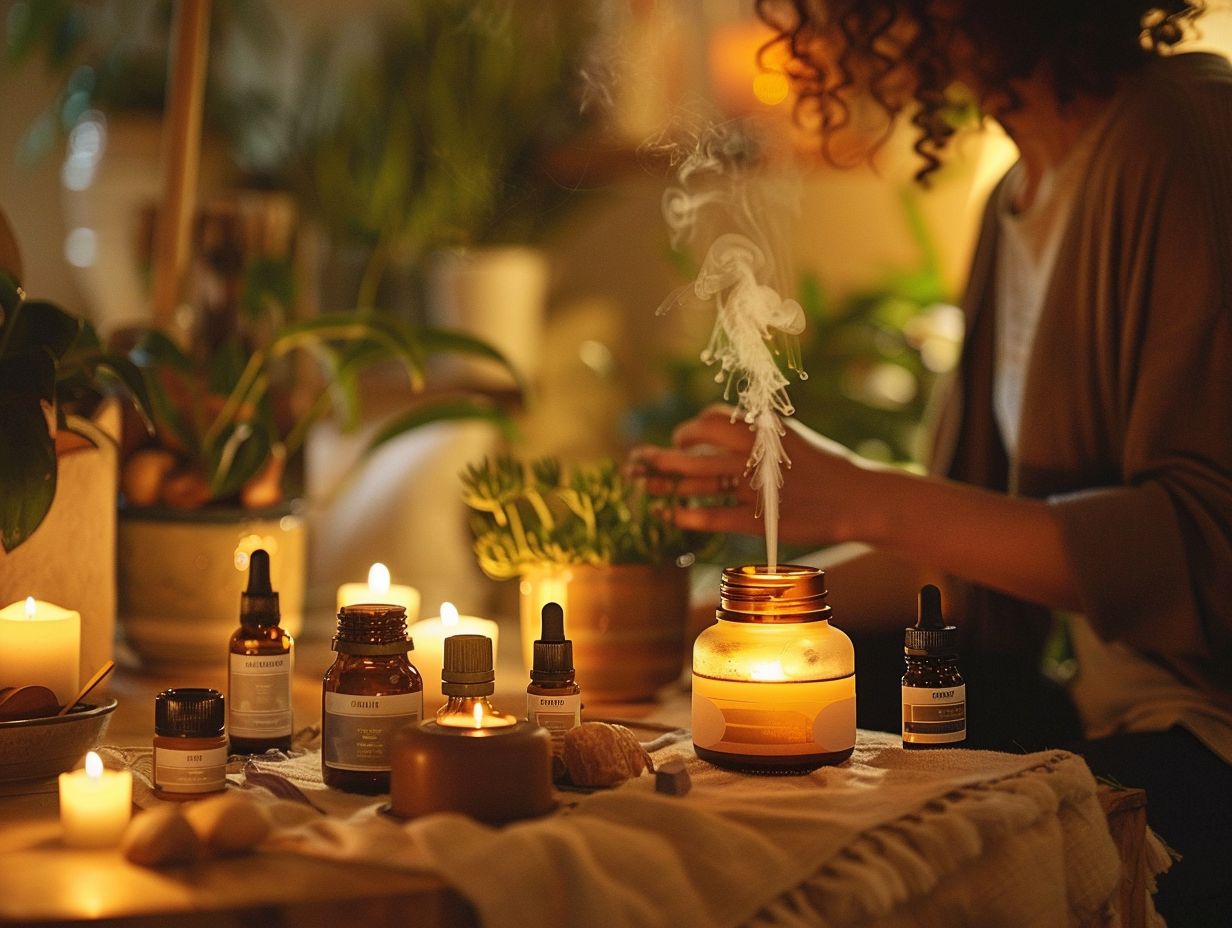
Inhalation is a common method of using aromatherapy, where individuals breathe in the essential oils’ aromatic molecules to stimulate the senses and promote relaxation. This method is particularly effective in reducing anxiety and enhancing emotional well-being.
When essential oils are inhaled, the molecules enter the nasal passages and stimulate the olfactory receptors, sending signals directly to the brain. This direct pathway triggers the release of neurotransmitters like serotonin and dopamine, which play a key role in regulating mood and emotions. Learn more about why aromatherapy is done.
The calming effect of aromatherapy inhalation can help lower cortisol levels, the stress hormone, leading to a more relaxed state both mentally and physically. This relaxation response aids in reducing symptoms of anxiety, promoting a sense of aromatherapy benefits.
Individuals experiencing anxiety can benefit greatly from the soothing properties of essential oils through inhalation. The practice can provide a natural and non-invasive way to manage stress, promote relaxation, and improve overall emotional health.
Topical Application
Topical application involves applying diluted essential oils directly to the skin, allowing for absorption and localized therapeutic effects. It is essential to consider skin sensitivities and allergies when using aromatherapy topically to ensure safe and effective application.
When essential oils are applied topically, they can penetrate the body through the skin and enter the bloodstream, influencing various physiological systems. This method of application can be particularly beneficial for targeting specific areas of discomfort or promoting skin health. The localized therapeutic effects of topical application offer a direct and efficient way to address particular concerns, such as muscle tension or skin conditions.
Aromatherapy Diffusers
Aromatherapy diffusers disperse essential oil particles into the air, allowing for inhalation and creating a therapeutic environment. When using diffusers, it’s crucial to follow safety guidelines to ensure proper dilution and prevent any adverse reactions on the body.
The process of diffusing essential oils through these devices not only enhances the ambiance of a space but also offers various therapeutic benefits ranging from stress relief to improved focus and relaxation. The gentle diffusion of oils can help in alleviating congestion, boosting mood, and even promoting better sleep patterns.
Safety should always be a top priority when using aromatherapy diffusers. Proper ventilation and regular cleaning of the diffuser are key aspects to prevent any buildup of residue or mold. It’s important to use high-quality essential oils and check for any potential allergic reactions before extended use.
Precautions and Safety Measures
While aromatherapy offers numerous benefits, it’s essential to take precautions and follow safety measures to ensure a positive experience. Consulting with a healthcare provider or aromatherapy professional can help individuals navigate any potential risks or allergies associated with essential oils.
As with any holistic practice, precautions play a crucial role in harnessing the full benefits of aromatherapy. Ensuring that essential oils are properly diluted and used according to recommended guidelines is key to preventing adverse reactions. Being aware of any existing allergies and sensitivities is paramount in selecting the right oils for individual needs.
Professional guidance is invaluable in this regard. A qualified aromatherapist can provide personalized recommendations based on an individual’s health history and goals, reducing the likelihood of experiencing any negative effects. This level of expertise enhances the safety and effectiveness of incorporating aromatherapy into one’s wellness routine.
Dilution of Essential Oils
Proper dilution of essential oils is crucial to ensure their safe application on the body and prevent skin sensitivities or adverse reactions. Following regulatory guidelines and best practices for dilution ratios is essential for maximizing the benefits of aromatherapy.
Undiluted essential oils are highly concentrated extracts that can be too potent for direct application to the skin, potentially causing irritation or other undesirable effects. Diluting them in a carrier oil helps distribute the essential oil evenly over the skin, reducing the risk of skin reactions.
Dilution aids in slowing down the absorption rate of essential oils into the skin, allowing the body to process them more effectively without overwhelming the system. This gradual absorption minimizes the risk of any potential adverse reactions that might occur with undiluted oils.
Allergies and Sensitivities
Individuals should be cautious of allergies and sensitivities when using aromatherapy, as certain essential oils can trigger skin reactions or respiratory issues in sensitive individuals. Conducting patch tests and consulting with a dermatologist can help in identifying potential allergens before full-body application.
A common risk of allergies in aromatherapy is contact dermatitis, characterized by redness, itching, or swelling on the skin after exposure to certain essential oils. Sensitivities can also manifest as respiratory problems, such as coughing or asthma-like symptoms, in individuals with heightened reactivity. Properly diluted oils and limiting exposure duration can reduce the likelihood of adverse reactions. It’s crucial to be aware of any pre-existing skin conditions or respiratory issues before engaging in aromatherapy practice.
Consultation with a Professional
Seeking guidance and consultation from healthcare providers or aromatherapy professionals is advisable before starting an aromatherapy regimen, especially for individuals with underlying health conditions or concerns. Professionals can provide personalized recommendations and ensure safe and effective aromatherapy use.
Aromatherapy involves the use of essential oils to promote physical and psychological well-being through targeted aromas. While essential oils have numerous benefits, improper usage can have adverse effects, such as skin irritation or allergic reactions.
Consulting with an expert ensures that the chosen oils align with the individual’s health profile, minimizing risks and maximizing benefits. Professionals can also guide on appropriate dilution ratios, application methods, and potential contraindications.
Healthcare providers possess the knowledge to evaluate potential interactions between essential oils and existing medications, offering invaluable insights for a safe and harmonious integration of aromatherapy into one’s wellness routine.
Conclusion
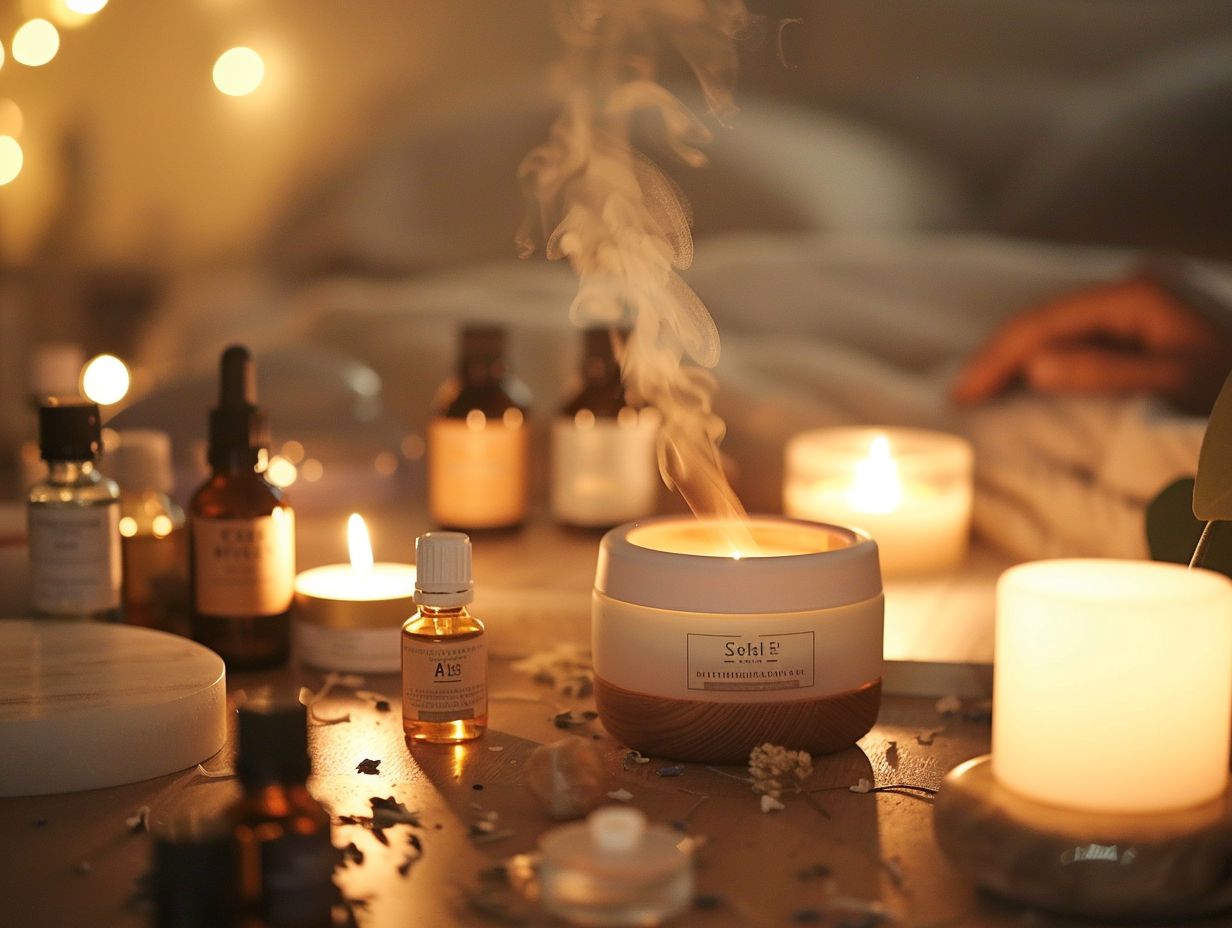
In conclusion, aromatherapy offers a natural and holistic approach to improving health and well-being, with a myriad of benefits for the body and mind. When used safely and under professional guidance, aromatherapy can complement conventional healthcare practices, providing individuals with a gentle yet effective therapy option.
One of the key aspects of aromatherapy is its ability to promote relaxation and reduce stress, which in turn can have a positive impact on overall health. The use of essential oils in aromatherapy timing can also help improve sleep quality, boost mood, and alleviate symptoms of anxiety and depression.
It is essential to follow safety measures when using essential oils, as they are highly concentrated substances. Diluting oils properly, performing patch tests, and seeking advice from a qualified aromatherapy practitioner are crucial steps to ensure safe usage.
References
For further information on aromatherapy, references from reputable sources, including medical journals and research studies, can provide valuable insights into the efficacy and safety of essential oils for therapeutic purposes.
Research has indicated that essential oils have been used for centuries in various cultures for their potential healing properties. Several studies published in respected medical journals such as the Journal of Alternative and Complementary Medicine and the Journal of Clinical Biochemistry and Nutrition have highlighted the positive effects of essential oils on reducing anxiety, improving sleep quality, and alleviating symptoms of certain health conditions.
A comprehensive review in the International Journal of Aromatherapy analyzed the therapeutic benefits of essential oils for pain management and stress reduction, validating why aromatherapy is important in complementary medicine practices.
Frequently Asked Questions
Why do we do aromatherapy?
Aromatherapy has numerous benefits for both the mind and body. It can improve mood, relieve stress and anxiety, promote relaxation, and even help with physical ailments. Aromatherapy also has a long history of use in traditional medicine and has been proven effective in various studies.
What are the most common reasons for using aromatherapy?
Aromatherapy is often used for stress relief, relaxation, improved sleep, and to boost overall well-being. It can also be used to alleviate symptoms of headaches, muscle tension, and respiratory issues. Additionally, some people use aromatherapy to enhance their mood or to create a calming atmosphere.
How does aromatherapy work?
Aromatherapy works by stimulating the olfactory system, which is responsible for our sense of smell. The molecules in essential oils are inhaled and then travel to the brain, where they can have a direct effect on emotions and mood. They can also enter the bloodstream and have a physical impact on the body.
What are the different ways to do aromatherapy?
Aromatherapy can be done in a variety of ways, including inhaling essential oils directly from the bottle, using a diffuser to disperse the oils into the air, adding oils to a bath or shower, or mixing them with carrier oils for massage. Some people also use aromatherapy in their skincare or haircare routines.
Are there any potential risks or side effects of aromatherapy?
While generally considered safe, there are potential risks and side effects of aromatherapy. Some people may have allergies or sensitivities to certain essential oils, so it’s important to do a patch test before using them. Additionally, some oils may interact with certain medications or have adverse effects on pregnant or nursing women.
Do I need to consult a professional to do aromatherapy?
While it is possible to do aromatherapy at home, it is recommended to consult a certified aromatherapist for personalized guidance and recommendations. They can help you select the right oils and methods for your specific needs and ensure safe and effective use.

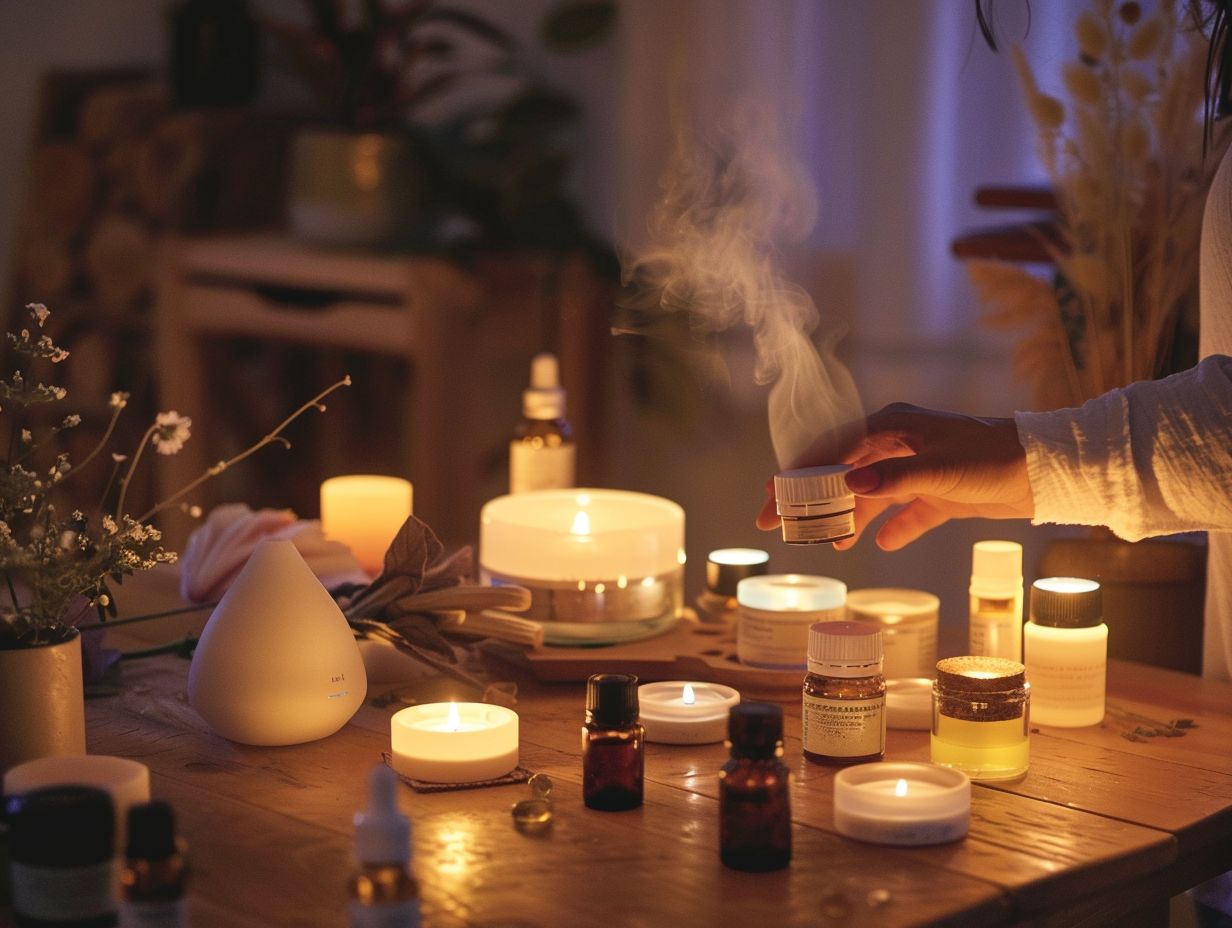
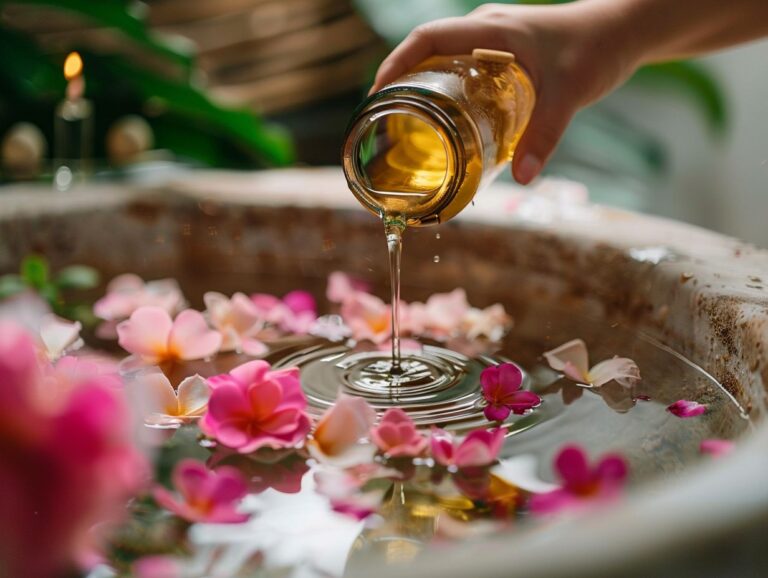
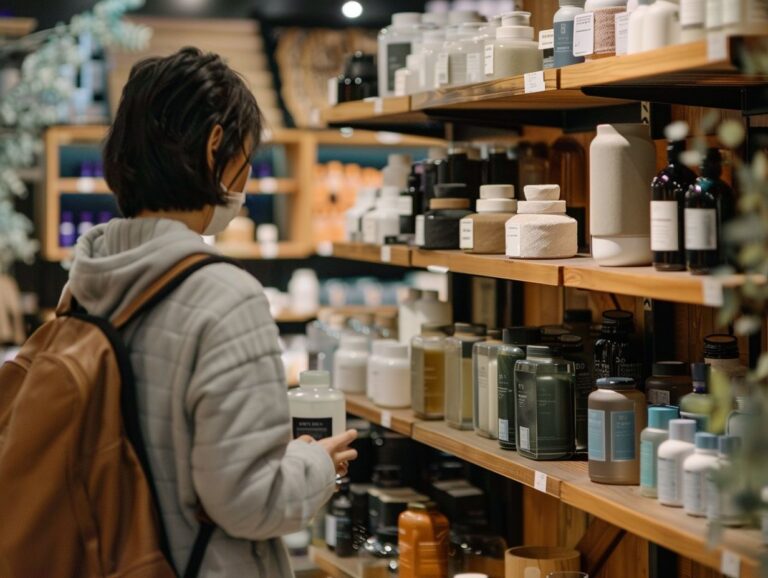
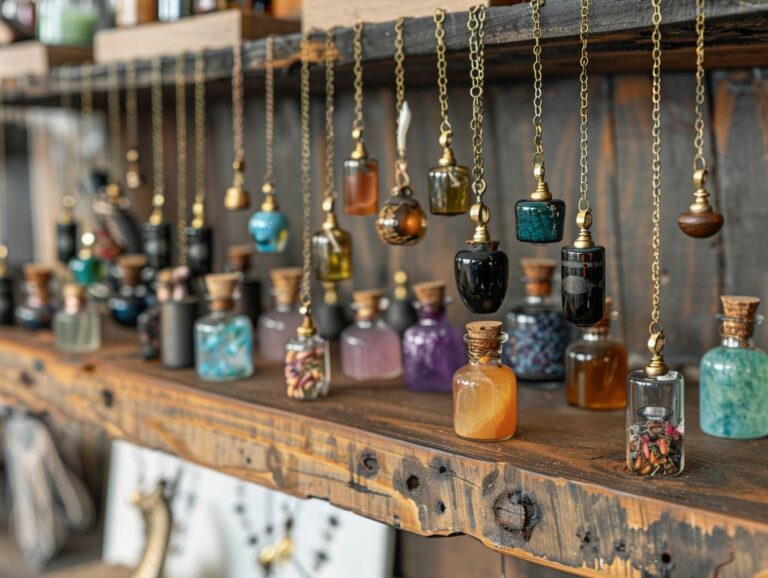
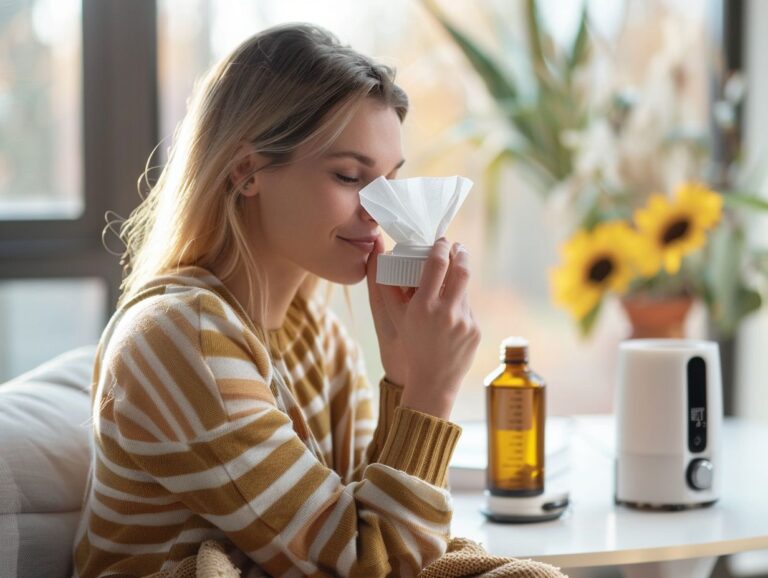
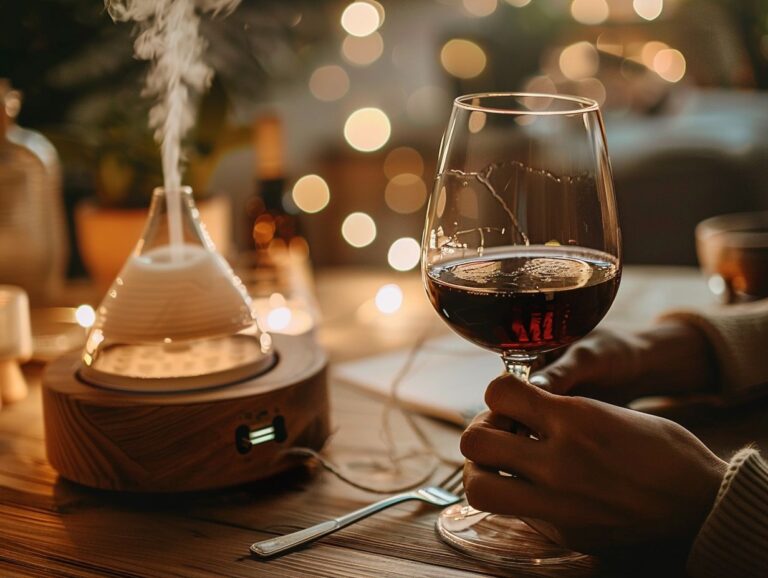

One Comment